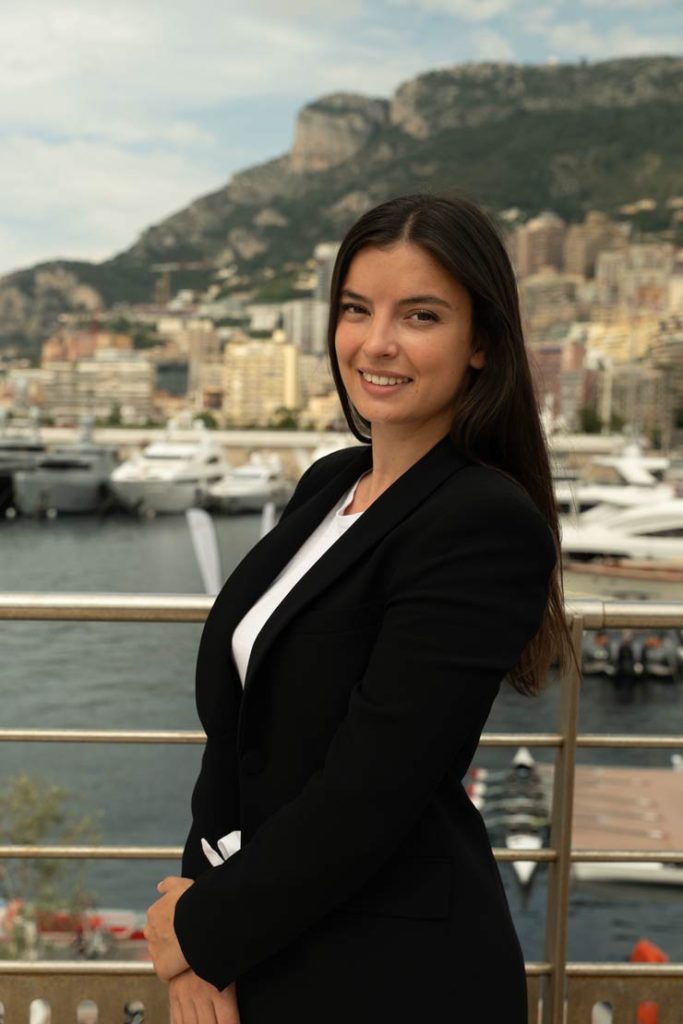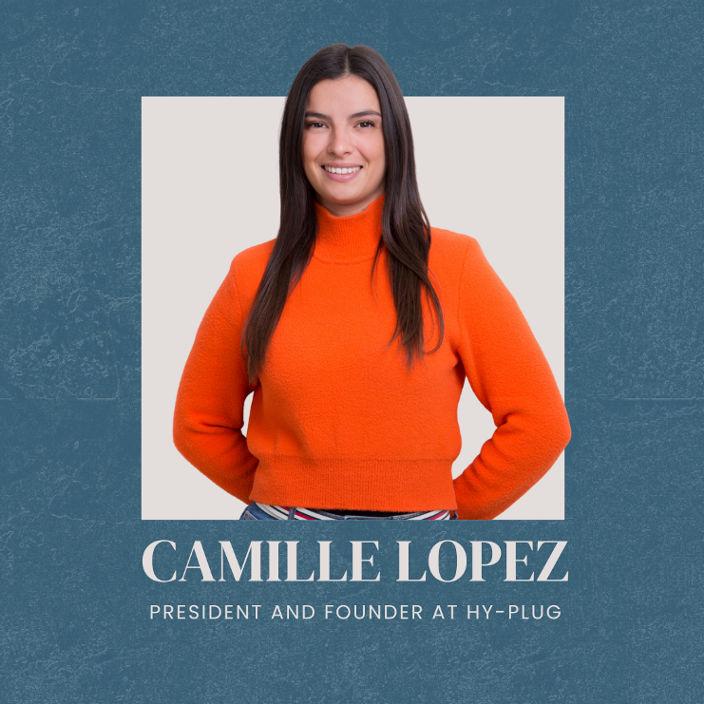CATEGORIES
People We Admire | Relationship Building | Social ImpactOverview:
- Growing up in Six Fours les Plages, France with a family boat sparked Camille’s love for sailing and environmentalism.
- She founded HY-Plug to focus on sustainable maritime energy solutions, overcoming early market skepticism.
- With HY-Plug, she won sustainability awards, secured major contracts, and gained recognition at the Monaco Yacht Show.
- Camille values impactful mentorship and practical experience over traditional leadership roles.
- She promotes hydrogen, electric, methanol, and biofuels as practical solutions for decarbonizing the maritime industry.
1. Can you tell us more about your childhood sailing experiences with your father and how they have shaped you into the person you are today?
I was born and raised in Six Fours les Plages, a small city near the sea in France. Close by, there is Toulon, one of the biggest military ports in the region, and it’s surrounded by smaller coastal towns along the Côte d’Azur. You might know the region better by its famous spot, Saint-Tropez, which is about an hour’s drive from where I am, on the western side of the region. Where I grew up, my family has had a boat since I was three months old. The boat, named Camille, is a cherished family vessel—a small wooden boat known locally as a “Pointu.” It’s a traditional boat often used by local fishermen but has become a beloved family day boat.
I learned everything about sailing, mooring, and handling boats with this vessel. In high school, I also took sailing lessons from a local sailing school, where I sailed weekly in Optimists and Hobie Cats, which are small, engine-free boats. My sailing knowledge has been shaped by my experiences with the family boat and these school lessons. Growing up by the coast, I’ve always admired the beautiful light blue waters of our region. However, as I got older, I noticed the increasing pollution, which was a stark reality compared to what was often depicted on TV. Seeing these changes first hand made me realize the urgent need for environmental action.
This personal connection to the sea and witnessing the environmental changes over time inspired me to pursue a career in the maritime industry. I’ve also earned various sailing licenses—coastal, inland waters, offshore and SRC —just for the love of it and to deepen my understanding, even though I didn’t necessarily need them for practical purposes. My passion for sailing and protecting the environment has been a driving force throughout my journey.

2. What are some significant challenges you have faced in your professional and personal journey?
One of the biggest challenges I’ve faced in my career while advocating for a transition to sustainable energy has been timing. We’re now in 2024, and the first IMO regulations won’t come into effect until 2030. I often hear that it’s still too early for many, and people say they need more time. However, I decided to enter the market early with HY-Plug because I wanted to be a pioneer in this energy transition, rather than joining the industry later when it becomes more mainstream and competitive.
At the start, I knew the market wasn’t fully ready. Despite the growing discussions about sustainability, many companies still don’t prioritize it. They might publicly support the idea but, behind the scenes, they aren’t focusing on it yet. This discrepancy has meant that, in practice, I spend more time educating others about the importance of sustainable energy than actually doing business. Building connections and negotiating contracts has also been a slow process. For example, it took six months to a year to finalize agreements, which is a crucial part of establishing a solid foundation for HY-Plug. The business landscape is challenging because timing is everything. My goal is to be well-positioned by 2030 when mandatory CO2 reduction targets come into effect. I hope that by then, the industry will recognize the value of the work we started years before.
Thanks to our past and current customers, taking the topic seriously and working on it since 2021. There are pioneers too, and we are cheerful to them for their trust.
In the meantime, I focus on making meaningful connections and working on projects that align with our mission. For instance, I signed a contract with Monaco Ports earlier this summer and collaborated with Lorenzo Shipyards to implement sustainable changes. The journey involves a lot of patience and persistence, and I believe that being early to the market will ultimately pay off when others face the pressures of new regulations. I hope sharing these insights helps others understand the realities of transitioning to sustainable energy and the importance of perseverance and timing in this field.
3. Can you describe the growth and journey that led you from a sales intern to a founder, and ultimately to your success?
When I was in the second year of my master’s program, I saw a business plan competition, “The Mark Challenge”, and decided to enter. Although I didn’t have a clear project idea, I was determined to compete and win. I started brainstorming and realized that while I was familiar with automotive engines, the professional side of the boating industry was new to me, which I found exciting because it meant there was a lot to learn. I was 23 and realized that focusing on conventional energy engines, like V12s, wouldn’t be viable for starting a new company by 2021. Instead, I decided to dive into the boating sector, specifically exploring sustainable energy.
I contacted various stakeholders, including hydrogen storage suppliers, biofuels producers, methanol logisticians and electric supercharger manufacturers, and discovered a major gap: there was no real connection between the various players in the industry. I wanted to create a network that would bridge this gap and provide transparent, honest consultancy without conflicts of interest. My approach was to work directly with clients, offering them unbiased advice while connecting them with the best suppliers for their needs. This model allowed me to avoid the pitfalls of typical sales practices and focus on creating genuine value for my clients. Despite skepticism from some quarters about the viability of my project, I persevered and eventually won first ever double awards at the competition for sustainability and yachting. This recognition validated my approach and encouraged me to push forward. I continued to build my network and secure contracts, including significant deals with Monaco Ports and other key players. As an extra challenge, I competed in the Monaco Ocean Protection Challenge, and won in category 1.
In 2022, I participated in the Monaco Junior Chamber International competition and, despite doubts from others, won first place, the Monaco Government Prize. This victory accelerated my plans, leading me to establish a second company in Monaco and secure major contracts for hydrogen projects in the South of France and other regions. Throughout 2023, I attended numerous events, made thousands of connections, and secured important deals, such as a biofuels contract in the Emirates. The success at these events demonstrated the value of persistence and networking in building a successful business. One of the most significant milestones was being featured in the Sustainability Hub at the Monaco Yacht Show, which provided an excellent platform to showcase our work. This ongoing partnership has been instrumental in our continued growth.
Over time, HY Plug evolved from a concept to a full-fledged consultancy. We now focus on hydrogen, electricity, biofuels, and methanol for the maritime industry. We work on everything from bunkering stations to energy generation on board. We’ve managed to grow our network to over 1,300 suppliers and have built strong connections across the industry.
On a personal level, horse riding and engines have always been my passions. I’ve been riding horses since I was four, and when I was 14, I got my dream horse. This connection with nature and my experiences with endurance races gave me a deep appreciation for the environment, which fuels my commitment to sustainability. Growing up, I was surrounded by engines and mechanical work, thanks to my father. This technical background has been invaluable in my work, allowing me to understand and navigate the complex world of environmental impact versus lobbying and politics.
Reflecting on my journey, I’ve learned the importance of adapting my business model, staying persistent, and focusing on genuine client needs. Success comes from understanding the market, being open to evolving your approach, and never underestimating the value of networking and real-world feedback.

4. As a leader of a company like HY-Plug and other initiatives, what does leadership mean to you?
To me, leadership isn’t just about holding a title or taking charge; it’s more about the impact you have on others. For instance, in 2021, I participated in the Monaco Ocean Protection Challenge as a candidate. Despite the competition being somewhat underwhelming in terms of recognition—I just received a paper and no significant accolades—the experience was invaluable. The following year, I was invited to be a jury member, and then, the year after that, I was asked to mentor student teams. Being asked back repeatedly has been a rewarding affirmation of my approach.
This year, I mentored both a student team and a professional team. The feedback I received was incredibly positive, with people saying that my insights and guidance were truly beneficial. I recently received an email from one of the teams, and although I haven’t had the chance to respond properly yet, it’s heartening to know that my involvement made a difference.
To me, leadership is about making a positive impact and inspiring others, even if it’s in ways I might not always fully understand. It’s not about fitting into a conventional mold or adhering to expectations based on age or experience. Instead, it’s about having a vision, acting on what you believe is right, and creating value for those around you. Hearing that my actions and words have motivated others and seeing their projects grow over time is one of the most rewarding aspects of leadership. It’s less about being a conventional leader and more about making a meaningful, positive difference in people’s lives.
5. How does your role at the Water Revolution Foundation as a signatory impact you and your work at HY-Plug, and does it add any additional responsibilities?
I signed on with the Water Revolution Foundation in 2021, at a very early stage of my company. One of the highlights of this partnership happened in September 2022 during the Monaco Yacht Show. The foundation was contracted to assess the lifecycle of various companies participating in the show. Since I was already a signatory, I was able to facilitate a lot of communication between the show organizers and the foundation. I helped translate their requirements for lifecycle assessments and clarified what was realistic and what could be considered greenwashing.
Being a signatory allowed me to make valuable connections and smooth out some of the challenges. For instance, when the Yacht Show needed to onboard certain companies, I was able to use my relationships to resolve issues quickly. If there were difficulties or misunderstandings, I could step in, make calls, and help move things along.
6. Have you had mentors who guided you through important parts of your career? If so, could you share some insights into the importance of mentorship?
I’ve had a range of experiences with mentorship and incubator programs, and I find that there are two perspectives on this. There’s the conventional view and then there’s my personal approach, which isn’t always the most traditional. From an official standpoint, I’ve found that some of the mentorship and incubator programs I’ve participated in didn’t always meet my expectations. For instance, I often wondered how someone who hasn’t built a company themselves could offer meaningful advice on setting one up. It seemed to me that these mentors sometimes lacked practical, real-world experience, which limited their ability to provide valuable guidance.
I had a mentor who suggested that my day rates were too low, given that my company was only a year old. He was around 55, and compared his day rate (3 000€) to mine (500€ by that time), so I told him candidly that I hoped to be earning much more than he was at his age when I reached that milestone. My point was that, given the disruptive nature of my work and the industry’s current state, pricing myself at his level wouldn’t be competitive. Instead, I aimed to build value and credibility first, which eventually allowed me to command higher rates. I’ve found that true value in mentorship often comes from engaging with professionals who have substantial experience in areas relevant to your own field. For instance, I once spoke with a woman who had a remarkable career in the maritime and yachting industries. Despite her own small company, she had an impressive network and deep industry knowledge. Her insight was invaluable because she understood the nuances of the industry and didn’t focus on irrelevant details like social media aesthetics.
What I’ve learned from these experiences is that effective mentorship should come from those who have walked the path you’re on. They should offer practical advice grounded in their own experiences rather than theoretical or generalized guidance. In my role as a mentor, I strive to provide practical advice and insights based on my own experiences, and I avoid advising on areas outside my expertise. Mentorship is most beneficial when it’s practical, relevant, and based on real-world experience. That’s what I seek in mentors and aim to provide as a mentor myself.
7. Share one thing that you think is essential for someone to succeed in their startup.
I’d say that resilience is a key characteristic of mine, and a lot of it comes from my experiences with horse riding, which I started almost 20 years ago. Back then, my instructors had a very straightforward approach: if you weren’t seriously injured enough to go to the hospital, you got back on the horse and finished the exercise. This tough love taught me to push through challenges and setbacks, no matter how small they seemed. Similarly, I learned resilience from my dance teachers, who held high standards and expected perfection, often with little tolerance for complaints.
This kind of tough coaching might not be the ideal way to learn for everyone, but it instilled a deep sense of persistence and the ability to overcome obstacles in me. This mindset has translated into my professional life. When faced with obstacles, I don’t easily give up. If I’m trying to connect with someone important and encounter obstacles, like a gatekeeper blocking my way, I persist. If reaching out to the assistant doesn’t work, I’ll try contacting other departments or even the CEO directly if necessary. My approach is to push through barriers until I achieve my goal, always remaining respectful and professional.
Even when faced with resistance, I maintain a high level of courtesy and formality in my communications. This strategy has been effective, especially when dealing with clients or stakeholders who are older and may not expect a young professional to have the knowledge and determination I bring. By being persistent and polite, I often find that I can eventually secure the meetings or opportunities I’m aiming for.
So, my advice would be to always be resilient and persistent. If you encounter obstacles, don’t be discouraged. Push through, stay respectful, and keep trying until you reach your goal. This approach has served me well and helps me turn challenges into opportunities for success.

8. What initiatives does your company take to fight climate change, and what is your opinion on how companies in the maritime sector can reduce their carbon footprint?
One of the most straightforward solutions for decarbonization right now is biofuels. In Western Europe, for instance, biofuels like HVO (Hydrotreated Vegetable Oils) are relatively affordable compared to other regions, such as the U.S. HVO, which is derived from treated vegetable oils, and can reduce CO2 emissions by up to 90%. It’s a viable option because it uses waste products rather than food crops, which helps avoid the issue of diverting food resources to fuel production. In addition to HVO, we’re also seeing developments in waste-to-liquid (WTL) fuels. This technology is particularly promising for regions with significant waste management issues, like parts of North Africa and India. By converting waste into fuel on-site, these areas can both manage waste and produce a usable energy source. However, when we look at other energy solutions like hydrogen and methanol, it becomes more complex. Hydrogen, while offering a clean energy source, involves challenges in production and transportation.
Green hydrogen, for instance, is only as clean as the energy used to produce it. The process can involve CO2 emissions, and transporting hydrogen is logistically challenging and energy-intensive. Methanol, which is used for storing and transporting hydrogen, is more practical but comes with its own set of issues, including corrosiveness and safety concerns. Adopting these new technologies is often challenging due to the high costs and technical complexities involved. For example, I’ve observed that while some organizations and governments are eager to invest in these solutions, they often lack a comprehensive understanding of the underlying science and practicalities. This knowledge gap can lead to inefficient investments and missed opportunities.
I’ve been involved in training sessions to help bridge this gap, providing clear explanations and practical insights about these technologies. Despite my efforts and state certifications, it’s frustrating to see that many individuals and organizations still don’t take advantage of these opportunities, often citing high costs as a barrier.
While biofuels like HVO and WTL offer promising pathways for immediate decarbonization, hydrogen and methanol present more complex challenges. Effective implementation requires not only technological innovation but also a deep understanding of the science and logistics involved.
9. Aside from biomethanol and hydrogen, are there other fuels you’re exploring? How do these compare to diesel in terms of efficiency?
There’s one brand currently leading the field with hydrogen fuel cells, achieving 60% efficiency. They’ve managed this with a unique design, incorporating a 230-kilowatt fuel cell on a seven-meter boat, alongside 160-kilowatt batteries. This setup provides a lot of power relative to the boat’s size and allows for efficient direct use of the fuel cell. In contrast, most other brands use 80-kilowatt fuel cells, which means they rely more on stored battery power rather than directly using the fuel cell.
The efficiency of hydrogen fuel cells varies widely, with most suppliers currently offering between 30% and 40% efficiency. This is comparable to conventional petrol engines, so there’s a lot of debate about whether investing in fuel cells is worthwhile given this level of efficiency. Additionally, there’s a lot of lobbying in the industry, so it’s essential to verify claims with real-world data from systems that have been installed and tested.
When it comes to biofuels, they present a different set of advantages. From a life cycle assessment (LCA) perspective, biofuels are quite efficient because they don’t require significant changes to existing systems for HVO. You simply switch the fuel, which is the least disruptive change. The overall environmental impact is lower compared to developing new components like batteries, fuel cells, or electric propulsion systems. Biofuels also have practical benefits, such as reduced wear on engines and filters compared to conventional fossil fuels, although the efficiency gains are relatively modest but impacting range or speed. For existing systems, biofuels are currently the fastest and easiest way to decarbonize operations with minimal impact.
Looking ahead, fuel cells and advanced technologies might offer better long-term solutions. However, internal combustion engines (ICE) do not give up and changes are under development with bi-combustion H2/GO. For example, there are advancements in fuel cell designs and battery technology that could improve efficiency and reduce environmental impact. However, right now, biofuels remain the most practical option for immediate decarbonization with the least disruption to existing systems.
Conclusion:
Camille Lopez’s story is a testament to the impact of combining personal passion with professional drive. From her early days sailing in Six Fours les Plages to founding HY-Plug, Camille has navigated challenges with resilience and innovation. Her focus on sustainable maritime energy solutions and practical mentorship demonstrates how dedication to environmental progress can transform industries and inspire future leaders.


